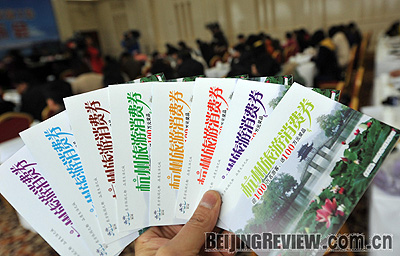|
Playing With Babies' Lives
U.S. baby product manufacturers Johnson & Johnson and Pampers are suspected of using toxic substances like formaldehyde in their products, according to a foreign consumer rights organization. However, no Johnson & Johnson baby product has been removed from shelves in any Chinese supermarkets. Retailers all claim that they are waiting for the authority's examination results. When the media tried to confirm whether China's General Administration of Quality Supervision, Inspection and Quarantine had started this work, the department denied it.
 |
|
TIME TO SPEND: Much doubt surrounds the campaign to boost consumption and economic growth through government-issued shopping vouchers (WANG DINGCHANG) | In Changchun, capital of northeast China's Jilin Province, there were once suspicious cases of babies becoming ill from Johnson & Johnson products. Where there is smoke, there is fire. This case at least proves that Johnson & Johnson products are not as safe as we think they are. Therefore, whether the products will be left on the shelf or removed all hinges on the test results of the authority. More importantly, users of Johnson & Johnson products are the most vulnerable social group-babies. When it comes to baby products, the quality watchdog is expected to conduct examinations and act even if there is only a slight suspicion of the products' safety.
Without examination results, many consumers express mistrust toward Johnson & Johnson baby products. This brings no benefit to this company, consumers or the state's plan of spurring domestic consumption.
Qilu Evening News
Sidetracking Public Opinion
The amendment of Land Administration Law is to be submitted to the National People's Congress for deliberation this year, and a draft of this amendment has been sent to the country's land administration department for suggestions. Of the 49 added clauses, people are most concerned about one change that may affect their immediate rights and interests.
Since China adopted the reform and opening-up policy in the late 1970s, more people have started to own private apartments with a 70-year contractual term. According to the Property Law that took effect in October 2007, the right to use housing land will be automatically renewed after the contractual term expires and also, according to the Land Administration Law drafted in 2008, the land use right will be renewed automatically without additional fees. However, in this new modification, the wording of "without additional fees" has been replaced by a vague regulation, which says when the 70-year term expires, land users have to pay a huge sum for continuing to use the land.
It's strange that such a draft amendment that relates to the public's immediate rights and interests is only discussed within the Ministry of Land and Resources, and has not been presented to the public for general opinions. With the added clause, it's quite possible that some departments will ask for money when the term expires after 70 years.
When it comes to a law that affects everybody, it's important to hear the public's voice, so as to ensure social justice, equality and stability.
Yangzi Evening News
Shopping Vouchers Campaign Naïve
Shopping vouchers worth 60 million yuan ($8.8 million) have been issued since March 20 in southeast China's Hangzhou City, Zhejiang Province. On that day, a local municipal official bought 3,000 yuan ($441.2) worth of vouchers, encouraging locals to follow suit.
Hangzhou is the first city in China to issue shopping vouchers and is a leading advocate of this campaign. But, are the numerous shopping vouchers really able to boost economic growth?
In this round of global financial turmoil, ordinary people have no income growth and thus their purchasing power has not become stronger than before. To expect the public to spend more than before when their purchasing power is the same is a naïve idea. Besides, to a large extent, issuing vouchers is nothing but a sales strategy. In the past, businesses tried to promote sales through discounting, and now the discounting is conducted in the form of shopping vouchers. So there is no essential change in the promotional concept.
When the voucher carnival draws to its end, everyone will find that shopping vouchers' function in bolstering consumption is limited. We should not blindly believe in the effectiveness of shopping vouchers.
Guangzhou Daily
Uni Ranking List Fraud?
With his authority and credibility hanging under a black cloud because of fraud allegations, the president of Tianjin University recently revealed that he refused to offer money to an organization that compiles a list to rank universities. His revelation proved that there is indeed profiteering going on behind the university-ranking list scheme.
Tianjin University's refusal shows its integrity and grace. The university dares to do so, because it has strong academic performance and does not need to buy a good reputation. For prestigious universities like Tsinghua University and Peking University, even if they refuse to pay for high ranking positions, what can these compilers do?
However, some unknown second- or third-class colleges are very excited about the ranking, because they hope to improve their reputation, attract more students and win more support from the government, by moving up the university-ranking list. In order to change their circumstances, they have to spend some money.
Although the university-ranking list is doubted by many people, it still influences some students and parents when they choose schools. Now, it's really time to tackle profit-driven university ranking, so as to maintain the independence of universities and save students from being misled.
Workers' Daily | 